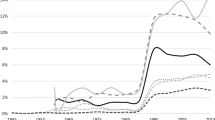Abstract
An earlier article, drawing on the mathematical theory of rules and rule complexes, extends and generalizes game theory (GGT). The theory has been used to conceptualize and analyze diverse social relationships, roles, and games as particular types of rule complexes.For instance, a social role, as a major basis of a parent's action in a game, consists of at least four key components – which are mathematical objects – in the determination of action: value complex, model of reality (including beliefs and knowledge bases), a repertoire of acts, routines, programs, and strategies, and modality, a role-specific algorithm for determining or generating action in game settings. This article applies and extends GGT in analyses of a market bargaining game (a type of open game) and of the classical game of prisoners' dilemma (a type of closed game). The applications show the concrete effects of social embeddedness on game structuring, game interaction patterns and outcomes, and social equilibria.
Similar content being viewed by others
References
Alker, H. R., Jr. (1996). Rediscoveries and Reformulations: Humanistic Methodologies for International Studies, Cambridge: Cambridge University Press.
Baumgartner, T., Buckley, W. & Burns, T.R. (1975). Relational control: the human structuring of cooperation and conflict, J. of Conflict Resolution 19: 417-440.
Baumgartner, T., Burns, T. R. & DeVille, P. (1977). Conflict resolution and conflict development: the structuring and restructuring of games. In: Kriesberg, L. (ed.), Research in Social Movements, Conflicts, and Change, Greenwich, Conn.: JAI Press.
Boudon, R. (1996). The cognitivist model: a generalized ‘rational-choice model’, Rationality and Society 8(2): 123-150.
Boudon, R. (1998). Limitations of rational choice theory, American J. of Sociology 104(3): 817-828.
Bourdieu, P. (1977). Outline of a Theory of Practice, Cambridge: Cambridge University Press.
Buckley, W., Burns, T. R. & Meeker, D. (1974). Structural resolutions of collective action problems, Behavioral Science 19: 277-297.
Burns, T. R. (1990). Models of social and market exchange: toward a sociological theory of games and human interaction. In: C. Calhoun, M. W. Meyer & W. R. Scott (eds), Structures of Power and Constraint: Essays in Honor of Peter M. Blau, New York: Cambridge University Press.
Burns, T. R. (1994). Two conceptions of human agency: rational choice theory and the social theory of action. In: P. Sztompka (ed.), Human Agency and the Reorientation of Social Theory, Amsterdam: Gordon and Breach.
Burns, T. R., Baumgartner, T. & DeVille, P. (1985). Man, Decisions, Society, London/New York: Gordon and Breach.
Burns, T. R. & Buckley, W. (1974). The prisoners' dilemma game as a system of social domination, J. of Peace Research 11: 221-228.
Burns, T. R.& DeVille, P. (1999). On social equilibria. Paper presented at the International Economic Association World Congress, Buenos Aires, Argentina, August, 1999.
Burns, T. R. & Engdahl, E. (1998). The social construction of consciousness: collective consciousness and its socio-cultural foundations, Individual selves, self-awareness, and reflectivity, Parts I and II, J. of Consciousness Studies 5(1-2): 67-85.
Burns, T. R. & Flam, H. (1987). The Shaping of Social Organization: Social Rule System Theory with Applications, London: Sage Publications (reprinted 1990).
Burns, T. R. & Gomolińska, A. (1998). Modeling social game systems by rule complexes. In: L. Polkowski & A. Skowron (eds.), Rough Sets and Current Trends in Computing, Berlin/ Heidelberg: Springer-Verlag.
Burns, T. R. & Gomolińnska, A. (2000). The theory of socially embedded games: the mathematics of social relationships, rule complexes, and action modalities, Quality and Quantity 34: 379-406.
Burns, T. R., Gomolińska, A., Meeker, D., & DeVille, P. (1998). The General Theory of Games: Rule Complexes, Action Modalities, and Transformations, Uppsala Theory Circle Report: Uppsala, Sweden.
Burns, T. R. & Meeker, D. (1974). Structural properties and resolutions of the prisoners' dilemma game. In: A. Rapoport (ed.), Game Theory as a Theory of Conflict Resolution, Dordrecht, Holland: Reidel.
Burns, T. R. & Meeker, D. (1975). A multi-level, structural model of social behavior, Quality and Quantity 9: 51-89.
Burns, T. R. & Meeker, D. (1977). Conflict and structure in multi-level, multiple objective decisionmaking systems. In: C. A. Hooker (ed.), Foundations and Applications of Decision Theory, Dordrecht, Holland: Reidel.
Coleman, J. S. (1990). Foundations of Social Theory, Cambridge, MA: Belknap Press.
Goffman, E. (1959). Presentation of Self in Everyday Life, Garden City, NY: Doubleday, Anchor Books.
Goffman, E. (1961). Encounters, Indianapolis: Bobbs-Merrill.
Gomoliska, A. (1999). Rule complexes for representing social actors and interactions, Studies in Logic, Grammar, and Rethoric 3(16): 95-108.
Hall, J. (2000). A Theory of War and Peace. Presentation at the Swedish Collegium for Advanced Study in the Social Sciences, Uppsala, Sweden, February 3, 2000.
Hardin, R. (1982). Collective Action, Baltimore: John Hopkins University Press.
Harre, H. (1979). Social Being, Oxford: Blackwell.
Harre, H. & Secord, P. F. (1972). The Explanation of Social Behavior, Oxford: Blackwell.
Hechter, M. (1987). Principles of Group Solidarity, Berkeley: University of California Press.
Hollis, M. (1987). The Cunning of Reason, Cambridge: Cambridge University Press.
Machado, N. & Burns, T. R. (1998). Complex social organization: multiple organizing modes, structural incongruence, and mechanisms of integration, Public Administration 76: 355-386.
Olson, M. (1968). The Logic of Collective Action, New York: Schocken.
Parsons, T. (1968) [1937]. The Structure of Social Action, New York: Free Press.
Rasmussen, E. (1989) Games and Information: An Introduciton to Game Theory, Oxford: Basil Blackwell.
Scharpf, F.W. (1997). Games Real Actors Play: Actor-Centered Institutionalism in Policy Research, Colorado, Colorado: Westview Press.
Tsebelis, G. (1990). Nested Games: Rational Choice in Comparative Politics, Berkeley: University of California Press.
Von Neumann, J. & Morgenstern, O. (1972). Theory of Games and Economic Behaviour, Princeton: Princeton University Press.
Winch, P. (1958). The Idea of a Social Science and its Relation to Philosophy, London: Routledge and Kegan Paul.
Author information
Authors and Affiliations
Rights and permissions
About this article
Cite this article
Burns, T.R., Gomolinska, A. & Meeker, L.D. The Theory of Socially Embedded Games: Applications and Extensions to Open and Closed Games. Quality & Quantity 35, 1–32 (2001). https://doi.org/10.1023/A:1004825116540
Issue Date:
DOI: https://doi.org/10.1023/A:1004825116540




